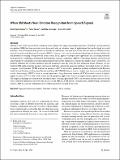When Old Meets New: Emotion Recognition from Speech Signals
Author(s)
Araño, Keith A; Gloor, Peter; Orsenigo, Carlotta; Vercellis, Carlo
Download12559_2021_Article_9865.pdf (3.671Mb)
Publisher with Creative Commons License
Publisher with Creative Commons License
Creative Commons Attribution
Terms of use
Metadata
Show full item recordAbstract
Abstract
Speech is one of the most natural communication channels for expressing human emotions. Therefore, speech emotion recognition (SER) has been an active area of research with an extensive range of applications that can be found in several domains, such as biomedical diagnostics in healthcare and human–machine interactions. Recent works in SER have been focused on end-to-end deep neural networks (DNNs). However, the scarcity of emotion-labeled speech datasets inhibits the full potential of training a deep network from scratch. In this paper, we propose new approaches for classifying emotions from speech by combining conventional mel-frequency cepstral coefficients (MFCCs) with image features extracted from spectrograms by a pretrained convolutional neural network (CNN). Unlike prior studies that employ end-to-end DNNs, our methods eliminate the resource-intensive network training process. By using the best prediction model obtained, we also build an SER application that predicts emotions in real time. Among the proposed methods, the hybrid feature set fed into a support vector machine (SVM) achieves an accuracy of 0.713 in a 6-class prediction problem evaluated on the Ryerson Audio-Visual Database of Emotional Speech and Song (RAVDESS) dataset, which is higher than the previously published results. Interestingly, MFCCs taken as unique input into a long short-term memory (LSTM) network achieve a slightly higher accuracy of 0.735. Our results reveal that the proposed approaches lead to an improvement in prediction accuracy. The empirical findings also demonstrate the effectiveness of using a pretrained CNN as an automatic feature extractor for the task of emotion prediction. Moreover, the success of the MFCC-LSTM model is evidence that, despite being conventional features, MFCCs can still outperform more sophisticated deep-learning feature sets.
Date issued
2021-04-19Department
Massachusetts Institute of Technology. Center for Collective IntelligencePublisher
Springer US